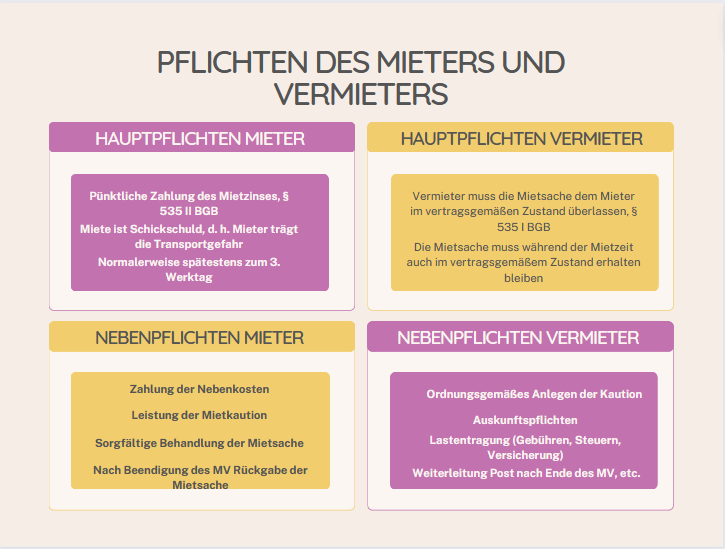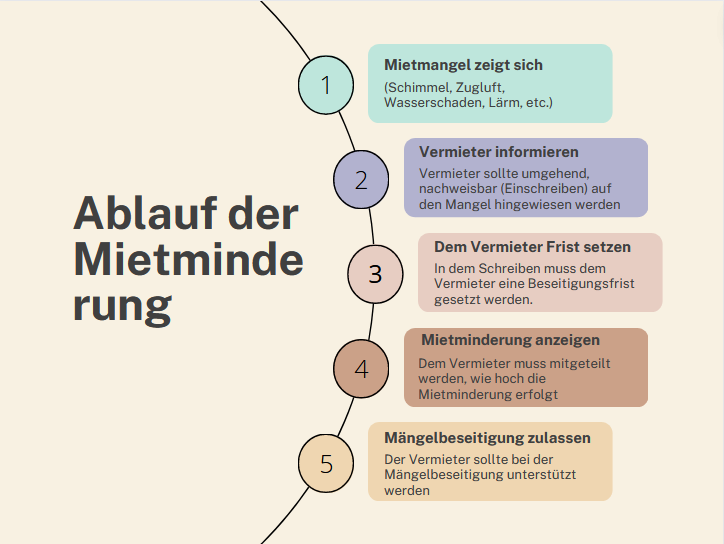Berlin Regional Court, 15.04.2016, Ref.: 65 S 400/15
Mould in the rented flat is always a major topic of dispute between the tenant and the landlord. The often high removal costs and the question of guilt cannot always be clearly clarified. The tenants blame the building fabric of the apartment building, while the landlord argues that it is due to the tenants' incorrect heating and ventilation behaviour. What is certain is that the landlord is not always responsible for the mould in the flat.
Many tenants ask themselves how many times a day they need to air their home in order to effectively prevent mould growth. In principle, it is sufficient to briefly ventilate the flat three to four times a day. Excessive airing, for example more than six times a day, is considered unreasonable. Especially in damp rooms such as the bathroom, correct ventilation plays a central role when it comes to mould in the bathroom and the landlord's responsibility.
If mould has previously appeared in the flat, this may be an indication of incorrect tenant behaviour. This can be caused by an average temperature that is too cold, incorrect wallpaper application or too little ventilation. Other factors, such as the airtight construction of the house, can also be responsible.
In the case of problems such as mould in the bedroom, responsibility often lies with the landlord if the building fabric or window insulation is the cause. In some cases, the cellar may also be affected. The question then arises as to whether the tenant must ventilate the cellar to prevent damp and mould growth. The individual usage situation of the rooms and the construction of the building are decisive here.

If mould develops in the rooms of the rented flat, the landlord must remove the moisture damage. Consequently, the landlord can demand that you ventilate three times a day: in the morning, at midday and in the evening.
If the tenant has to carry out shock ventilation more than six times in order to prevent mould infestation, this constitutes an unreasonable ventilation effort. For this reason, the tenant has a right to have the defect rectified and a right to a rent reduction as soon as mould infestation occurs.
Facts of the Court Case
Mould was forming in all rooms in the tenant's house
The specific case concerned a building that was built in the 1990s and had an airtight construction. Consequently, the plaintiff (tenant) complained to the defendant (landlord) that mould had formed in several rooms - guest toilet, bathroom, bedroom, kitchen and living room - in various forms and designs.
The landlord did not remove the mould, whereupon the tenant sued
When the mould was not remedied, the tenant sued. The flat was not in accordance with the contract or free of defects due to the mould.
The court of first instance then commissioned an expert. He determined that the cause lay in the particularly airtight condition of the plastic insulating glass windows.
Expert confirmed that the tenant was blameless
The plaintiff and his family could therefore not be accused of causing the mould infestation due to non-contractual use. Due to the type of construction, the plaintiff would have to air the room six to eight times a day to prevent mould infestation.
The defendant appealed against this - wrongly, the Berlin Regional Court ruled and largely confirmed the decision of the court of first instance.
Judgement of the Berlin Regional Court:
Regional court confirmed that the mould was caused by the building
The Berlin Regional Court ruled in favour of the tenant. According to Section 535 (1) BGB, the tenant is entitled to the condition of the flat in accordance with the contract, which also includes the removal of moisture in the walls, e.g. mould. This is because a flat with patches of mould - including important rooms such as the bathroom, the toilet room, the kitchen, a bedroom and the living room - is defective within the meaning of Section 536 BGB.
The tenant cannot be expected to ventilate the room 6-8 times a day
According to the expert, only shock ventilation more than six times a day could reliably prevent mould infestation. Airing six to eight times a day does not correspond to normal rental use and cannot be foreseen and therefore cannot be demanded.
In addition, the Berlin Regional Court awarded the tenant a rent reduction of EUR 101,000. This reduction in rent of 10% per month was not excessive in accordance with Section 536 (1) BGB. Only small areas of mould infestation were found, but several rooms were affected.

It may be true that there are structural measures that can optimise the current condition - installation of a radiator in the hallway area or additional insulation - but the tenant is not entitled to modernisation of the rented flat as part of the repair claim pursuant to Section 535 (1) BGB.
Source: Berlin Regional Court
Important Note: The content of this article has been prepared to the best of our knowledge and belief. However, due to the complexity and constant evolution of the subject matter, we must exclude liability and warranty. The content of this article has been compiled to the best of our knowledge and belief. If you need legal assistance with mould and landlord obligations, you should seek legal advice. An experienced lawyer will help you to correctly classify responsibility for mould in the bathroom, mould in the bedroom or damp cellar rooms. A legal assessment will also help you in the event of a dispute about how often you are allowed to air the room during the day. This way, you know exactly when the landlord is liable for mould and when you have to take action yourself. However, the complexity and constant changes in the subject matter make it necessary to exclude liability and warranty.
If you need legal advice, please feel free to call us at 0221 - 80187670 or send us an email at or send an email to info@mth-partner.de info@mth-partner.de
Lawyers in Cologne provide advice and representation in tenancy law.





One Response
Dear Mr Tieben
Tenants in our 2-family house only tilt the windows in the bedroom and bathroom and leave the blinds half down.
There is only a small amount of air exchange. We fear that mould will form at some point.
What can we do about it?
Yours sincerely
U.Böck